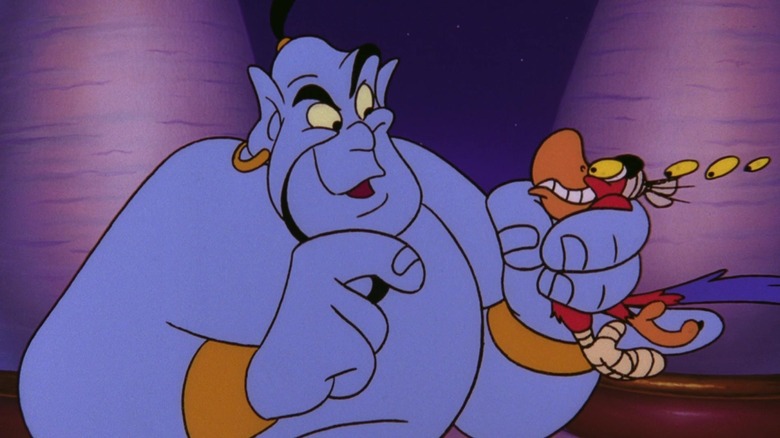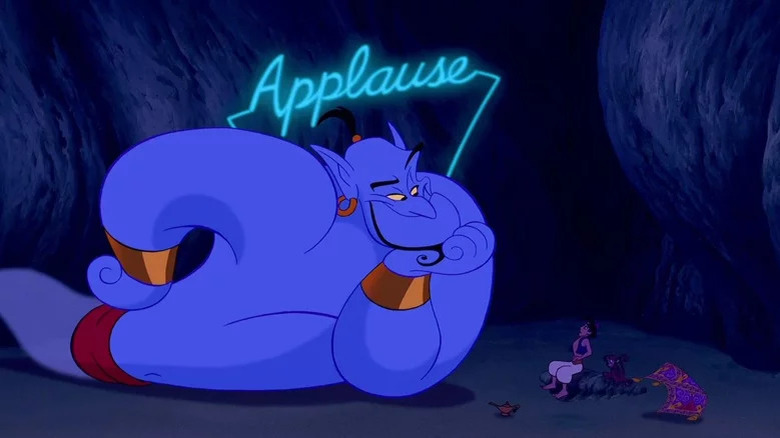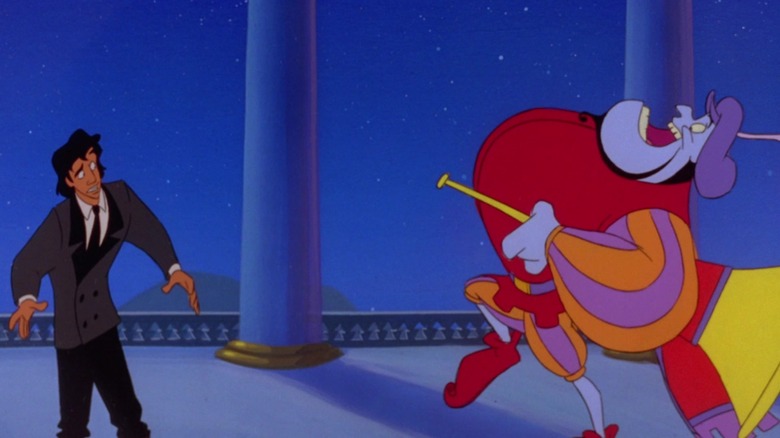The Simpsons Voice Actor Who Replaced Robin Williams In The Aladdin Franchise
As denizens of Blockbuster Video will be able to attest, the mid-1990s to early 2000s saw a massive glut of animated straight-to-video sequels and prequels to many of Disney's known animated features. There were sequels to "The Fox and the Hound," "Bambi," "Cinderella," "The Little Mermaid," "The Lion King," "Lady and the Tramp," "Atlantis: The Lost Empire," "The Emperor's New Groove," "Mulan," "Pocahontas," "Tarzan," "The Jungle Book," and even "Brother Bear." The sequels all came when there was a change of leadership at Disney, and the studio tripled-down on the mandate to make as much money as possible.
The only people who watched these movies were nostalgic Disney-obsessed adults who viewed them as a scientific curiosity, and sought to use them as talking points in long-form online articles. Very occasionally, the films were rented from Blockbuster by anyone who happened to be seven years old when the sequel in question was released.
Notable for this article are the two straight-to-video sequels to Disney's 1992 rendition of "Aladdin," based very, very loosely on "One Thousand and One Nights." Rob Musker's and Ron Clements' "Aladdin" saw a rascally vagrant (Scott Weinger) being recruited by the Sultan's evil vizier Jafar (Jonathan Freeman) to enter a dangerous living cave and retrieve the magic lamp inside. Aladdin ends up rubbing the lamp on his own and meeting the Genie (Robin Williams) that lived inside. Williams notoriously improvised a lot of dialogue, and the animators had to work overtime to accommodate his hilariously anachronistic impersonations.
After a wacky adventure, the Genie is set free from bondage, while the evil Jafar was transformed into a genie himself and imprisoned in a lamp.
When Disney wanted to make a DTV sequel to "Aladdin," they naturally wanted to make it about the genie version of Jafar, and figured Williams should come back. Williams, however, refused for reasons we'll get into below. Instead, Disney hired the amazingly talented Dan Castellaneta to play the Genie. Most people likely know Castellaneta as the voice of Homer Simpson.
Why Robin Williams didn't return
Robin Williams had long stayed away from animation, partly because voice acting had a minor stigma attached to it. In the pre-"Shrek" world, it was seen as gauche for a high-profile, live-action actor to lend their voice to an animated film. In the early 1990s, Williams agreed to star in a "message" film called "FernGully: The Last Rainforest," a fantasy film about deforestation and environmental disaster.
The story goes that Disney head Jeffrey Katzenberg approached Williams about "Aladdin," having mocked up a miniature animation test using William's stand-up routines as a basis. Williams loved the test and agreed to appear in "Aladdin," but only on the stipulation that he be used in less than 25% of the marketing materials. Williams wanted his performance to be enjoyed outside the circle of commercial glut. Katzenberg, however, immediately worked around this stipulation by including the genie in almost 100% of the marketing, but only taking up 25% of each poster. Williams was furious. Katzenberg also notoriously tried to buy the animation studio where "FernGully" was being made, actively attempting to sabotage the project.
Williams was enraged by the attempted dismantling of the "message" picture he was working on, and by the misuse of his name in advertising. For a few years, he wanted nothing to do with Disney, as he confirmed in a 1993 interview with the Los Angeles Times. Katzenberg, shifting into damage-control mode, and wanting to appear magnanimous, reportedly gave Williams a Picasso painting as an apology (!). Williams did not forgive him. By this time, "The Return of Jafar" was already in production, and it was 100% unlikely that Williams would participate.
As such, Disney hired a replacement: Dan Castellaneta. Which, all things considered, was an excellent choice.
Dan Castellaneta
Comedian and voice actor Dan Castellaneta had been working in comedy since the early 1980s, when he performed with The Second City in Chicago. He also did voiceover work for radio stations, and eventually auditioned for a role on "The Tracy Ullman Show." He didn't get the part, but Ullman was impressed with one of his stand-up routines, and he was hired to voice Homer Simpson on the show's "Simpsons" animated bumpers, created by cartoonist Matt Groening. That led to the notable animated series "The Simpsons" which has lasted well over 12 episodes.
Castellaneta, like many long-working voice actors, was an energetic vocal mimic, and could do a lot of wonderful celebrity impersonations, including Williams. His voice acting resume is lengthy, and contains some of the funniest performances you'll ever see; I recommend watching him perform the title role in the 1990s animated series "Earthworm Jim," or his villain performances in "Darkwing Duck." In 1993, he was tapped to play the Genie in "The Return of Jafar," and he naturally said yes, having worked with Disney before. It's unlikely he knew about the beef Williams was having with Katzenberg. He availed himself incredibly well, matching Williams energy, if not quite possessing the same range of impersonations. He's still amazingly funny.
In 1994, Katzenberg was fired from Disney and replaced by Joe Roth, who tactfully apologized to Williams in the Los Angeles Times. Williams accepted Roth's apology, and the bad blood started to wash away. It likely helped that Williams was also given a million dollars (!) to reprise the role of the Genie in "Aladdin and the King of Thieves" in 1996. Castellaneta, meanwhile, went back to his lucrative gig on "The Simpsons," and came back to Disney to perform in films like "The Hunchback of Notre Dame" and "Return to Neverland."
Everything worked out in the end.


